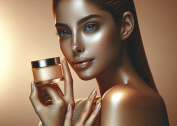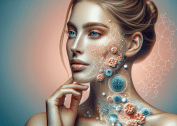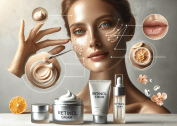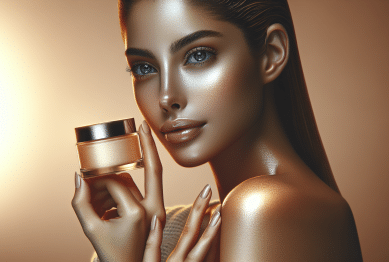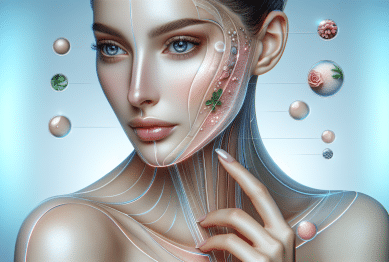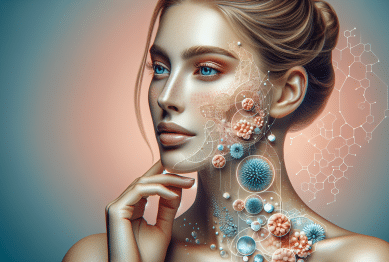Curious about collagen and what it really does? Explore the science behind collagen, discover its effects on skin elasticity, fine lines, and hair health, and learn how daily habits impact the body’s natural collagen production. This practical guide digs into proven strategies for wellness and beauty seekers.
What Collagen Really Is and Why It Matters
Collagen is one of the most abundant proteins in human bodies. It works as the structural backbone for skin, hair, nails, joints, and even the digestive tract. This protein provides strength and flexibility to tissues, helping the skin maintain suppleness and bounce. Many people associate collagen with plump, youthful-looking skin, and there’s a good reason for it. As we age, collagen levels begin to decline, leading to visible signs such as fine lines, wrinkles, and a loss of elasticity. Unravelling the role collagen plays in beauty and wellness can offer valuable insights for those seeking to maintain healthier skin and hair.
This natural protein forms a major part of connective tissues. It is responsible for giving structure and firmness not only to the skin but also for supporting strong, lustrous hair and resilient nails. In younger years, the body produces ample amounts of collagen, but production can slow with age or due to specific lifestyle habits. Sun exposure, a poor diet, and smoking can all hasten collagen breakdown, a fact that is often overlooked. Understanding how these factors influence collagen can influence daily choices in a beauty or wellness routine.
Collagen is present in over 25 types within the human body, but the most relevant for cosmetic and wellness concerns are Type I and Type III, especially for skin health. Type I provides the framework from which healthy skin, hair, and connective tissues are built. When thinking about youthful skin, the presence and integrity of these collagen types are what keep the surface feeling smooth and resilient. This foundational knowledge is crucial for anyone exploring beauty or anti-aging solutions involving peptides or hydrolyzed collagen products.
The Science Behind Collagen and Skin Aging
Research shows that collagen is directly linked to the skin’s ability to repair itself and maintain elasticity (Source: https://www.ncbi.nlm.nih.gov/pmc/articles/PMC3583892/). When collagen networks are full and well-structured, skin appears smooth and less prone to sagging. As collagen production drops, wrinkles and fine lines become more apparent. This is why so many skincare products and nutritional supplements focus on supporting collagen or stimulating its natural synthesis within the body. The primary focus is helping skin remain firm, hydrated, and luminous.
One commonly overlooked contributor to collagen breakdown is chronic sun exposure. Ultraviolet light accelerates the degradation process, making preventative care essential. Using sunscreen, enjoying shade, and consuming vitamins that support skin structure—like Vitamin C and amino acids—can slow visible signs of aging (Source: https://www.aad.org/public/everyday-care/skin-care-secrets/aging/skin-care-aging-healthy-skin). Lifestyle choices such as smoking or a high-sugar diet may also play a role in how quickly the skin loses firmness. Maintaining healthy routines isn’t just about what goes on the skin—it’s also about what happens inside the body.
Scientific studies have explored the impact of collagen supplementation and topical applications on skin integrity. Results indicate that products containing hydrolyzed collagen peptides can improve skin hydration, elasticity, and the appearance of wrinkles (Source: https://pubmed.ncbi.nlm.nih.gov/23949208/). However, the degree of these improvements can vary based on a person’s age, baseline nutrition, and how consistently products are used. The science suggests that a multi-faceted approach—diet, topical skincare, and lifestyle—offers the greatest potential for preserving youthful-looking skin.
Collagen and Hair: What the Evidence Says
While collagen’s reputation for supporting skin is well established, its benefits for hair are also worth attention. Hair follicles are partly composed of collagen-rich connective tissue. This means that collagen may support hair’s thickness, shine, and resilience to breakage over time. With aging or environmental damage, a decline in scalp collagen may result in thinner, weaker strands. Some research has observed that hydrolyzed collagen supplements could improve hair texture for some users, although more clinical studies are needed to fully confirm long-term results (Source: https://www.health.harvard.edu/blog/collagen-supplements-are-they-really-beneficial-202205242755).
Collagen also delivers indirect benefits for healthy hair. It contains amino acids such as glycine and proline, which are necessary for building keratin—the key structural protein in hair. By ensuring an adequate intake of these building blocks through diet or safe supplementation, some individuals may be able to promote fuller, more manageable hair (Source: https://www.ncbi.nlm.nih.gov/pmc/articles/PMC5315033/). Factors like oxidative stress, hormonal changes, and chronic inflammation can all impact the scalp’s health as well as hair growth cycles.
For those considering collagen products for hair care, it’s helpful to set realistic expectations. Not every person will experience dramatic changes from supplementation alone; factors like diet quality, stress levels, and proper scalp care all play a role. Combining a nutrient-rich eating plan with appropriate hair care routines—gentle brushing, less heat styling, and scalp massages—can boost the effectiveness of any supplement. Education and awareness about how collagen supports both hair strength and shine can help individuals make more informed beauty decisions.
Natural Ways to Support Collagen Production
The body has a remarkable ability to produce collagen naturally, especially when provided with the right nutrients. Eating a balanced diet with plenty of protein-rich foods, dark leafy greens, berries, garlic, and nuts can help foster an internal environment that supports collagen synthesis. Vitamin C is particularly important because it plays a direct role in forming collagen fibers (Source: https://www.hsph.harvard.edu/nutritionsource/vitamin-c/). Pairing these foods with lifestyle habits such as adequate hydration and regular exercise may also help maintain overall skin and hair health.
Minimizing habits that increase the rate of collagen loss is equally important. Smoking, excess alcohol, and chronic sun exposure all accelerate negative changes in collagen-rich tissues. Protective strategies include wearing broad-spectrum sunscreen, limiting direct UV exposure during peak hours, and avoiding harsh chemical treatments for skin and hair. Emphasizing mindfulness and stress-reduction practices can be helpful as well, since persistent stress has been linked to skin barrier disruption and premature visual aging (Source: https://www.ncbi.nlm.nih.gov/pmc/articles/PMC4458936/).
There are also holistic approaches worth exploring. Collagen-building facial massages, lymphatic drainage, and gentle exfoliation techniques are believed to stimulate healthy blood flow and skin regeneration. Research into adaptogens and antioxidant-rich superfoods has uncovered intriguing links to improved skin tone and resilience (Source: https://www.ncbi.nlm.nih.gov/pmc/articles/PMC6117694/). These practices can be included in a daily beauty ritual that supports natural collagen structure from the inside out.
Common Collagen Myths and What to Really Expect
Despite the headlines, collagen is not a miracle fix for all beauty concerns. Some myths persist—such as the idea that taking any form of collagen yields instant or dramatic results. Clinical data indicate that benefits for skin and hair typically appear with consistent use over several weeks or even months, and individual outcomes vary widely (Source: https://www.msdmanuals.com/home/skin-disorders/biology-of-the-skin/structure-and-function-of-the-skin). Supplements are not a substitute for a balanced diet or proper sun and skincare habits.
Another common misconception is that higher doses of collagen always deliver better results. In reality, the body can only absorb and utilize a certain amount at a time. More is not always better, and choosing reputable sources, whether in supplements or protein-rich foods, can reduce risks of allergic reactions or unwanted side effects. Reading product labels and understanding ingredient transparency matters, especially for those with sensitive systems.
Maintaining realistic expectations is essential. Collagen can be a useful tool in a broader wellness plan, but it is not a cure-all. A combined approach—nutritious eating, regular exercise, careful exposure management, and supportive skincare—is most likely to yield gradual and healthy improvements in appearance. Education remains key to navigating the growing market and finding truly sustainable ways to nurture skin and hair from within.
When to Consider Collagen Supplements or Skincare Products
For individuals noticing early signs of skin aging or those recovering from intensive environmental exposure, considering collagen supplements may be worthwhile. Scientific evidence points to benefits for people with certain nutritional deficiencies or those exposed to chronic stress factors (Source: https://ods.od.nih.gov/factsheets/Collagen-Consumer/). At the same time, topical skincare products with ingredients meant to support natural collagen—such as peptides or retinoids—have been investigated for their non-invasive, supportive roles in maintaining skin radiance.
Choosing the right supplement often involves comparing hydrolyzed collagen derived from sources such as fish, poultry, or bovine. Checking for third-party testing certification and seeking advice from a licensed nutritionist or dermatologist are both reasonable approaches. For those focused on topical options, understanding ingredient synergies—such as the combination of vitamin C and peptides—may offer superior results for maintaining a youthful glow.
Finally, an integrated routine is often most effective. Combining lifestyle changes, dietary improvements, mindful sun protection, and carefully selected supplements lays the groundwork for more resilient skin and hair. Regular monitoring and willingness to update one’s routine based on changes in skin or hair health can empower individuals to make evidence-based decisions. The path to vibrant wellness and lasting beauty is rarely quick, but a thoughtful, collagen-friendly approach often leads to satisfying results.
References
1. Proksch, E., Schunck, M., Zague, V., Segger, D., Degwert, J., & Oesser, S. (2014). Oral supplementation of specific collagen peptides has beneficial effects on human skin physiology: a double-blind, placebo-controlled study. Retrieved from https://pubmed.ncbi.nlm.nih.gov/23949208/
2. Harvard T.H. Chan School of Public Health. (n.d.). Vitamin C. Retrieved from https://www.hsph.harvard.edu/nutritionsource/vitamin-c/
3. American Academy of Dermatology Association. (n.d.). How to care for your skin as you age. Retrieved from https://www.aad.org/public/everyday-care/skin-care-secrets/aging/skin-care-aging-healthy-skin
4. National Center for Biotechnology Information. (2013). Skin anti-aging strategies. Retrieved from https://www.ncbi.nlm.nih.gov/pmc/articles/PMC3583892/
5. Harvard Health Publishing. (2022). Collagen supplements: Are they really beneficial? Retrieved from https://www.health.harvard.edu/blog/collagen-supplements-are-they-really-beneficial-202205242755
6. National Institutes of Health, Office of Dietary Supplements. (n.d.). Collagen Fact Sheet for Consumers. Retrieved from https://ods.od.nih.gov/factsheets/Collagen-Consumer/

